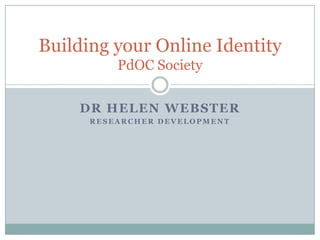
Building your online identity pd oc
- 1. Building your Online Identity PdOC Society DR HELEN WEBSTER RESEARCHER DEVELOPMENT
- 2. Slides Slides are online: Slideshare http://www.slideshare.net/drhelenwebster/
- 3. Social Media in Academia Enhancing or changing practice? Publishing Models: Open Access Publishing Quality Assessment Models: Altmetrics Funding: Collaboration, consortia and large projects Pedagogy: digital classroom, ‘pedagogy of abundance’ Conference ‘attendance’ – livestreaming, liveblogging, podcasting Impact: narrowcasting online and digital resources
- 4. Current levels of engagement Knowledge Engagement Refusal Ignorance
- 5. Current levels of engagement What do you currently use, and how? Your profile: Tools Personal, professional or mixed? Your use: Static or evolving? Consume or participate? Broadcast or interact?
- 6. Aims maximum Research Admin Professional and service activities Impact and Teaching public minimum engagement
- 7. Where to build your online identity? Proprietry/free The Academic The Open Web Web Password/open
- 8. Postdocs and Online identity You currently belong to an institution, a discipline and a profession. All these may change, and your webspace and contacts associated with them. Any open web platform you use may be removed or changed. How will you ensure longer-term online stability?
- 9. My identity?
- 10. Level: Minimum Passive, static broadcast model Visibility: Remaining completely invisible online takes effort Pros and cons of keeping a low profile these days Identity: To what extent is it possible to keep personal and private separate? Control: If you don’t, someone else will … Previous employers, universities, websites you register for - all out of date and out of context OR ‘friends’ may share personal material outside your own preferred circles….
- 11. Level: Minimum Visibility Visibility: Think about your metadata and keyword search terms link to ‘authority’ sites and have them link to you update ‘regularly’ and at peak times Complete profiles as much as possible
- 12. Level: Minimum Invisibility Invisibility: Google yourself regularly (set up Google alerts) and check for information put online by others Check privacy and permission settings carefully Use pseudonyms and abstract profile pictures Different platforms for different purposes Have a policy on ‘friending’, ‘following’ etc and add a clear statement of your intentions Avoid logins and synching with Facebook/Twitter/LinkedIn etc Don’t let your computer ‘remember’ your login
- 13. Level:Minimum Collate and disambiguate yourself Dr Jonathan Barnard, Prof. Denys Turner, Cambridge University Medieval Studies
- 14. Level:Minimum Building a static profile Your Department or Faculty webpage Your own website (tip: use a blog platform e.g. Wordpress) Creating profiles and ‘online cvs’ on networking sites: LinkedIn Facebook Academia.edu Google+ profile Google Scholar profile ResearcherID and ORCID Consume social media
- 15. Level: Minimum presenting yourself Use your real name (Namechk) Grab variants if possible Use a recognisable photo Use a consistent, concise ‘strapline’ summing up who you are and what you do Think about keywords, tagging, search terms and metadata Link everything
- 16. LinkedIn
- 17. Level: Medium active participation and networking Participatory, networked, interactive, pull not push Network: Types of connection, types of network • Interact: o Feed, respond, ask, share, curate, comment (and ‘like’)
- 18. Level:medium Building an online network Draw contacts from other accounts Search engines: Google, Social Media search engines, built-in search boxes in platforms Listorious Socialmention Technorati Keywords, people’s names Snowball- see who well-connected people and institutions are connected to Use suggestions…
- 19. Level: Medium Maintaining an online network Updating - what might you share? Profersional tone Validate their interactions – endorse, like, retweet, comment, ask Don’t just offer self-promotion! Reframe it. Pass on resources, links and contacts as well as your own information Frictionless sharing Genuine, mutually meaningful networking ‘Regular’ updates and interactions
- 20. Level: Medium Sharing digital offcuts Documents: Scribd, Issuu Slides: Slideshare Images: Flickr Livestreaming: Ustream, Livestream Various formats as PDFs: Academia.edu Bibliographies: Mendeley Research data and outputs: DSpace@Cambridge Creative Commons Licensing
- 21. LinkedIn
- 22. Level: Maximum You as ProdUser – create, not just consume Offcuts, ‘collateral damage’ from research, admin, teaching etc Create spaces to network and present Create and administrate a group Blogging Video and audio Group rather than individual?
- 23. A Strategy for Building an Online Identity Approach: Be as ‘open’, up-to-date and interactive as you can/feel comfortable Be professional, even in personal circles, but not personality-free Keep control over what’s posted Infrastructure: Choose a few sites to cover various needs and audiences, nominate one as central, link them Be consistent, or delete sites you’re not using Time management Frictionless workflow Set time aside once a month
- 24. Resources On Good Practice for Researchers Vitae’s Handbook of Social Media for Researchers and Supervisors RIN’s Social Media: A Guide for Researchers
